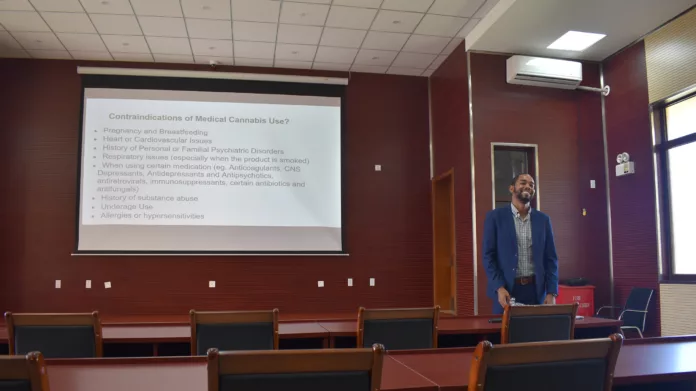
By Samantha Simon
[email protected]
Locals hoping to get into the business of medical marijuana can now do so at more affordable rates under a new licensing programme offering them a significant discount.
Regis Burton, CEO of the Antigua and Barbuda Medicinal Cannabis Authority (MCA), announced the new Collaborative Grow Licence during a briefing with media personnel on Wednesday.
This new licence is available to companies owned by five or more Antiguan and Barbudan citizens interested in operating in the medical cannabis industry.
Companies that are approved will be given an 80 percent discount on the licence, which will be valid for a period of five years, unlike the standard two years usually granted.
The licence is progressive, meaning those applying must first acquire a medical marijuana cultivation licence before registering for any of the other nine licences the MCA offers.
The price of the licence is dependent on a number of factors and finalised on a case by case basis.
The changes come after the MCA took into account the high costs that were barring many locals from entering the industry.
The usual cost of a cultivation licence for a plot less than 5,000 square feet is approximately USD$25,000 for two years. The new measures mean locals can get this licence for a five-year period at the discounted rate.
The MCA is hoping to encourage local entrepreneurs to be leaders in the medical marijuana industry.
During 2023, the MCA worked alongside local medical cannabis business operators to collaborate on streamlining legislation and processes within the industry, as well as expanding relations with other groups to promote responsible use.
By the end of the year, the authority had registered over 2,500 medical marijuana patients, with statistics showing that women are more inclined to access the two local dispensaries, Grow Antigua and Pineapple Road Antigua, due to safety and accessibility, compared to illegal black market sources.
Medical marijuana patients are also benefiting from a decrease in the cost of registration, with a one-year registration now costing EC$50, compared to EC$100 for locals last year.
Visiting tourists can now access dispensaries for US$5, compared to US$20 previously.
This price reduction is to make medical marijuana more competitive and readily accessible to patients, compared to illegal black market sources, thereby dissuading customers from purchasing from unregulated producers.
Currently there are five active medical cannabis licence holders in Antigua and Barbuda, with all holding cultivation licences, and two holding dispensary licences and transport licences.
Grow Antigua also holds licences for processing and extraction, research and infused product manufacturing. Burton said the company hopes to be able to begin manufacturing locally-made cannabis products and conduct research into medical cannabis.
This comes on the heels of work to begin exporting to Germany and other European Union countries that allow for the import of medical cannabis products, but this requires a great deal of preparation to meet their stringent regulations.
Burton also spoke to the authority’s work in education.
He noted that efforts are being made to tackle the issue of substance abuse by supporting relevant bodies in addressing the root causes, not just for misuse of cannabis, but also other substances such as tobacco and alcohol.
Whilst marijuana remains illegal in Antigua and Barbuda, in March 2018 the government amended the Misuse of Drugs Act to decriminalise possession of up to 15 grams.
This legislation has further evolved to allow for the use and licensing of medical marijuana for cultivation, sale and personal use.
In March 2023, Antigua and Barbuda became the first Caribbean country to grant the Rastafarian community official sacramental authorisation to grow and use cannabis for religious purposes. Jamaica, which is known as one of the homes of Rastafarianism, updated its legislation soon after.
